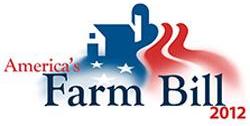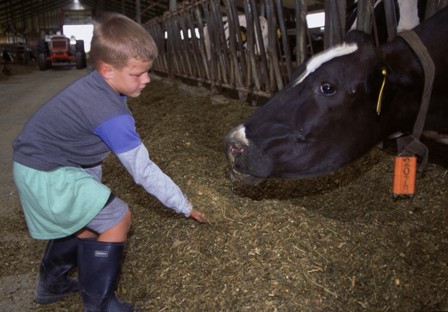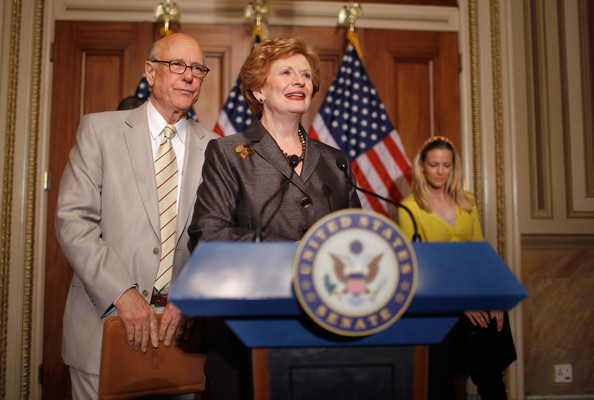After serving at NMPF for three months, staff member John Hollay has been promoted to the position of Senior Director, Government Relations. Hollay has done an outstanding job in the time he has been with NMPF, and the organization has benefited from his legislative experience and political acumen. He has been instrumental in successfully positioning the Dairy Security Act in both the Senate and the House.
Author: dcadmin
Dairy Groups Prepare for Joint Annual Meeting
With less than three months to go, staff members have been working on plans for the 2012 annual meeting that NMPF jointly hosts with the National Dairy Promotion and Research Board and the United Dairy Industry Association. This year’s meeting will be held October 29 – 31 at the Walt Disney World Dolphin Hotel in Lake Buena Vista, FL.
Centering on the theme “Securing Dairy’s Future,” attendees will arrive for a few days of speeches, reports, banquets, general sessions, town hall meetings, and award ceremonies. Dairy producers, cooperatives, Young Cooperators (YCs), industry representatives, staff, and others from within the dairy sector are all invited to attend. Guest speakers will include AgriTalk host Mike Adams, sports commentator Dick Vitale, political pundit Stu Rothenberg, and entertainer Laura Bell Bundy.
Information will be posted online at www.nmpf.org/nmpf-joint-annual-meeting as it becomes available.
Farm Bill in Limbo during August Congressional Recess
The battle over the Farm Bill shifts this month from Washington, DC, to the hundreds of congressional districts across America, to which members of Congress have returned for their August recess. NMPF has issued a call to action to its members, urging dairy farmers and their cooperatives to voice strong support for the passage of a new farm bill while their elected representatives are back home.
Last week, the House tried and failed to pass a one-year extension of the current farm bill that would have offered no value to dairy farmers. Because NMPF and most other farm groups opposed this approach, the House leadership pulled the bill, and instead passed a $300 million drought assistance bill that also offers little real support to dairy farmers. NMPF sent a letter to Congress expressing its disappointment that the House failed to act on a new Farm Bill.
The current farm bill expires at the end of September, and once the House and Senate return to Capitol Hill on Sept. 10th, there are fewer than 10 legislative days for them to act on farm policy before that deadline. The most likely current scenario is that farm policy will have to wait until an anticipated lame duck session of Congress is held after the November elections. In order to bring the Dairy Security Act to completion, members of both the House and Senate need to hear that getting a new bill is a priority to dairy farmers.
CWT-Assisted Export Sales Top 120 Million Pounds in 2012
Through the end of July, Cooperatives Working Together (CWT) has assisted member cooperatives in making 436 sales of cheese and butter to 33 countries on five continents.
Sales of Cheddar, Monterey Jack, and Gouda cheeses accounted for 302 sales totaling 71.5 million pounds, while the 134 sales of butter totaled 55.3 million pounds. This compares to 2011, when CWT assisted with 184 sales for the first seven months of the year, totaling 56.6 million pounds.
The milk equivalent on a milk fat basis of CWT’s 2012-assisted sales is 1.87 billion pounds, or the same as the annual production of 88,800 dairy cows. This accounts for half of the increase in milk production through the first six months in 2012.
House Passes Bills to Protect Children’s’ Right to Work on Farms
NMPF was heartened by the vote in the House of Representatives late last month to pass the Preserving America’s Family Farms Act. This legislation, sponsored by Rep. Tom Latham (R-IA), and cosponsored by more than 90 other members, prohibits the Secretary of Labor from finalizing or enforcing regulations in the future that would change the definition of the ‘parental exemption,’ change the student learner exemption, and significantly redefine what practices would be acceptable for youth under the age of 16 in which to participate.
Even though the Department of Labor earlier this year withdrew its contentious proposed rule restricting the work that children could do on farms, NMPF still remains concerned that the issue could surface again at some point in the future.
“Although the Obama Administration has said it won’t go down this path again, NMPF wants to be certain that subsequent administrations don’t attempt something similar, which is why this bill was needed,” said Jerry Kozak, President and CEO of NMPF. “We will continue to encourage the Labor Department to work with rural stakeholders to develop education programs to reduce accidents to young workers and promote safer agricultural working practices.”
Farmer and Rancher Group to Host Another Food Dialogues
The U.S. Farmers and Ranchers Alliance (USFRA), of which NMPF is a member, will host another two-day Food Dialogues session this fall to discuss how food is produced, with a special focus on the use of antibiotics and biotechnology, and how these methods are portrayed in the media. Additional details, including event moderators and other speakers, will be announced in the next several weeks. In the interim, USFRA has created a section of its website where individuals can sign up for more information and receive updates as they become available.
The meeting will be held November 15 in New York City and will be modeled after the Food Dialogues session held earlier this summer in Los Angeles. That meeting, held in late June 2012, brought together entertainment movers and shakers, chefs, academics, large restaurant operators, journalists, local leaders, and farmers and ranchers for an in-depth conversation about food.
In addition, this summer USFRA is looking for a handful of farmers and ranchers who are proud of what they do and eager to share their stories of continuous improvement with others. The winners of this nationwide search for the “Faces of Farming and Ranching” will be announced in January 2013, and will put a real face on today’s agriculture. Dairy farmers can nominate others – or themselves – by going to www.fooddialogues.com.
NMPF Asks Members of Congress to Meet with Dairy Farmers During August Recess to Discuss Need to Pass New Farm Bill
ARLINGTON, VA – The National Milk Producers Federation (NMPF) is asking members of Congress, as they return home for the August congressional recess, to meet with struggling dairy farmers in their districts to discuss the perilous economic conditions affecting farmers, and the urgent need for Congress to pass a new farm bill yet in 2012.
“NMPF believes this type of one-on-one dialogue will enable members in both the House and the Senate to see firsthand the need for passing a five-year farm bill, including the vital reforms to the nation’s dairy policy in the form of the Dairy Security Act (DSA),” said NMPF President and CEO Jerry Kozak.
“We hope that Members of Congress will take time to visit local dairy farms to experience up-close the challenges dairy farmers are facing and understand why it is so imperative to pass a five-year farm bill which includes a better safety net for farmers,” Kozak said. “We are approaching a crisis comparable to or worse than that of 2009, when dairy farmers lost $20 billion in equity and thousands of farmers went out of business.”
“When you factor in additional operating costs, such as labor and energy costs, on top of the sky-high price of feed caused by the ongoing drought, dairy farmers are currently selling their milk for far less than the cost of production,” said Kozak. “The Dairy Security Act would give producers and their bankers the assurances they need to continue their operations through these tough times.”
Kozak said that farmers themselves should take this message to their elected officials during the next four weeks, with the hope that Congress can be spurred to action after Labor Day.
“We applaud the pledge from Senate Agriculture Committee Chairwoman Debbie Stabenow (D-MI) and House Agriculture Committee Chairman Frank Lucas (R-OK), and Ranking Members Pat Roberts (R-KS) and Collin Peterson (D-MN), to continue their push for full passage of a comprehensive, five-year farm bill after the August recess. NMPF will continue to stand behind our agricultural leaders in this effort to pass a five-year farm bill this year.”
The National Milk Producers Federation (NMPF), based in Arlington, VA, develops and carries out policies that advance the well being of dairy producers and the cooperatives they own. The members of NMPF’s 30 cooperatives produce the majority of the U.S. milk supply, making NMPF the voice of more than 32,000 dairy producers on Capitol Hill and with government agencies.
The Only Choice
Out of the different options for what to do now with farm policy, doing nothing should not be one of those. At least, it’s not an option that benefits taxpayers, farmers, or even our federal legislators on Capitol Hill.
After plowing enormous effort this year into creating a new and better farm program, first in the Senate, then in the House, the path forward for lawmakers is now very murky. Congress made major progress earlier this summer when the House Agriculture Committee approved a bill in July that closely resembles the version of the Farm Bill that passed the full Senate in June.
But the process hit a huge pothole after that, with the House leadership deciding not to bring the Ag Committee’s bill to a vote. Instead, they initially tried to gin up support for a one-year extension of the current farm bill. But after NMPF and other farm groups objected, the House then passed a disaster aid package on Aug. 2nd that does essentially no good for most dairy farmers. This is a completely different approach than that taken by the Senate, and with Congress now in recess for more than a month, farm policy is stuck in limbo.
What’s worse, between the political parties’ two conventions this summer, and pressures to focus on campaigning rather than governing this fall, it’s unclear when the Farm Bill will get the attention to bring it to fruition. We need to make certain that this politically-driven inertia, while not unusual just months before a major election, doesn’t derail the work that’s been accomplished so far.
The new bill, both in the Senate and House, is smart policy and smart politics: both versions save the government money compared to the status quo. Passing a final bill will be a boon to taxpayers, and represents another opportunity to chip away at the federal deficit at a time when budget and economic issues are the big concerns for our nation. And it’s hard to believe that, especially in a year when the Corn Belt is suffering the worst drought in half a century, Congress will ignore farm country issues, and votes, mere months before a pivotal election.
Let me also briefly address why the Dairy Security Act provisions in both bills are also the only choice for farm policy going forward. The Senate has already approved a new safety net for dairy farmers that provides them margin insurance – both a basic program, as well as a supplemental level – that offers better protection than that offered by the current MILC program, and the price support program. Those who want this insurance offering – and it’s an opportunity, not an obligation, to enroll in the program – will be asked to temporarily trim their milk output when conditions are poor as part of the market stabilization element of the measure.
The Senate, both at the Committee level, and in the full body, saw this program as a reasonable approach to improving risk management for dairy farmers, while reducing taxpayer costs – and, critically, reducing the potential risk to taxpayers. The market stabilization element reduces the cost of the program by helping prevent prolonged periods of poor margins that will generate significant USDA insurance payments to those enrolled in it.
In the House, however, a failed attempt was made in the Agriculture Committee by Reps. Bob Goodlatte and David Scott to strip out the market stabilization program. This approach would have gutted the insurance protection of dairy title by putting more risk and more cost onto the backs of farmers. It would have increased their out of pocket costs, reduced the amount of milk they could insure, and perhaps most appallingly, it would have zeroed out any ability to indemnify new milk production during the lifespan of the farm bill.
For those who profess to be concerned about the future growth of the U.S. dairy sector, this last provision alone should be a deal-breaker, so let me repeat it: any farmer who would bring on new milk production during the five-year span of the bill would not be able to insure any of that growth. This to me is really “supply management.” Just as the MILC program doesn’t offer protection to the majority of the current milk supply because of its tight production cap, this watered-down margin insurance program would not offer insurance coverage to a single pound of any expanded milk output beyond a farm’s original base. It’s a de facto quota system that would severely hamper the ability of our industry to be the healthy, growing, future-oriented business that we all say we desire.
This is why any future attempt to fight this battle again needs to be defeated, and why when Congress does turn its focus to the Farm Bill, they need to preserve the version already approved by the House Agriculture Committee. Choosing to do nothing is not leadership, nor a choice that makes sense.
NMPF Opposes Extension of Present Farm Bill
 Proposed Effort Would Provide No Real Relief for Dairy Farmers
Proposed Effort Would Provide No Real Relief for Dairy Farmers
The National Milk Producers Federation (NMPF) today issued the following statement expressing strong opposition to attempts by the House to extend a version of the current farm bill by one year and reiterating support for the inclusion of Dairy Security Act (DSA) in any final farm bill package:
“The current safety net for dairy farmers is not sufficient in dealing with scenarios like we are currently facing from high feed costs associated with the ongoing drought,” said Jerry Kozak, President and CEO of NMPF. “If we are going to be serious about providing better protection for the nation’s dairy farmers while at the same time providing taxpayer savings from current programs, then we should pass a new farm bill which includes the DSA, which was included in both the Senate-passed farm bill and the farm bill recently passed out of the House Agriculture Committee.
“Under the proposed extension, the Milk Income Loss Contract Program (MILC) would not pay out for the remainder of 2012 or for 2013 while the nation’s dairy farmers are experiencing razor-thin margins. The proposed 2008 farm bill extension does nothing to ensure dairy farmers and their bankers that they will have any safety net to deal with the present and future periods of tight margins and extreme volatility.
“Our current dairy policy is outdated and costs more to taxpayers while the new provisions actually save taxpayer dollars. Dairy farmers have spent more than three years working closely with legislators in crafting comprehensive dairy policy reform so that they have a stronger safety net while at the same time reducing the burden for taxpayers. Any outcome that does not include these carefully crafted provisions would be a failure to lead agriculture in the right direction.”
“We urge both the House and the Senate to reject an extension of our failed policies.”
The National Milk Producers Federation (NMPF), based in Arlington, VA, develops and carries out policies that advance the well being of dairy producers and the cooperatives they own. The members of NMPF’s 30 cooperatives produce the majority of the U.S. milk supply, making NMPF the voice of more than 32,000 dairy producers on Capitol Hill and with government agencies.
NMPF Statement on House Child Labor Legislation Vote
 From Jerry Kozak, President and CEO of NMPF:
From Jerry Kozak, President and CEO of NMPF:
ARLINGTON, VA – “We are heartened by the vote in the House of Representatives yesterday to pass the Preserving America’s Family Farms Act. This legislation, sponsored by Rep. Tom Latham (R-IA), and cosponsored by more than 90 other members, prohibits the Secretary of Labor from finalizing or enforcing such regulations in the future. This includes any effort, similar to what was made this year, to change the definition of the ‘parental exemption,’ change the student learner exemption, and significantly redefine what practices would be acceptable for youth under the age of 16 in which to participate.
“Even though the Department of Labor earlier this year withdrew its contentious proposed rule restricting the work that children could do on farms, NMPF remains concerned that the issue could surface again at some point in the future.
“Although the Obama Administration has said it won’t go down this path again, we want to be certain that subsequent administrations don’t attempt something similar, which is why this bill is needed. We continue to encourage the Labor Department to work with rural stakeholders to develop education programs to reduce accidents to young workers and promote safer agricultural working practices.”
(Before the vote, NMPF and a coalition of other agriculture organizations sent a letter to the House of Representatives, urging them to preserve the ability of youth to gain training and education by working on the farm.)
The National Milk Producers Federation (NMPF), based in Arlington, VA, develops and carries out policies that advance the well being of dairy producers and the cooperatives they own. The members of NMPF’s 30 cooperatives produce the majority of the U.S. milk supply, making NMPF the voice of more than 32,000 dairy producers on Capitol Hill and with government agencies.
National Milk Producers Federation Statement on IDFA News Release on Milk Supplies
 From Jerry Kozak, President and CEO of NMPF:
From Jerry Kozak, President and CEO of NMPF:
“The International Dairy Foods Association (IDFA) has mischaracterized the real issue facing dairy farmers this summer.
“Summer heat always leads to a slowdown in milk output – this year will be no different – but the USDA reported last week that milk production in the second quarter of 2012 was up 2.0% compared to 2011, while the first quarter was up a whopping 5.3%. The U.S. is well on track to produce a record volume of milk this year, a hot summer notwithstanding.
“As a result, farmers’ prices this June were down 18% from June 2011, 30 cents a gallon less. Consumers really should be asking if the price they pay at retail for dairy products have dropped by the same amount. The answer is, retail prices haven’t changed, even as the farm price this year has reflected the fact that supply has raced ahead of demand. Meanwhile, grain prices reflect the opposite: that supplies are short in relation to demand.
“The dairy policy provisions in the Senate and House farm bills are tied to the critical difference between the farmer’s milk price, and the cost of feed. When that margin contracts to dangerously low levels, those who volunteer to use the proposed program will be insured against these low margins – and they are also expected to trim their milk output until margins reach healthy levels.
“These summer temperatures, and the possibility of a poor crop harvest, are exactly why we need a dairy farm safety net that takes into account higher feed prices, and also gives us a tool to better align supply and demand. Relying on the weather to perform this process is foolish.”
The National Milk Producers Federation (NMPF), based in Arlington, VA, develops and carries out policies that advance the well being of dairy producers and the cooperatives they own. The members of NMPF’s 30 cooperatives produce the majority of the U.S. milk supply, making NMPF the voice of more than 32,000 dairy producers on Capitol Hill and with government agencies.
Senate Passes Farm Bill with Crucial Dairy Policy Reforms
 NMPF-Backed Dairy Security Act Emerges Intact After Dozens of Amendments Debated
NMPF-Backed Dairy Security Act Emerges Intact After Dozens of Amendments Debated
ARLINGTON, VA – The dairy policy reforms that have been under development for three years were included in the 2012 Farm Bill approved by the Senate Thursday by a vote of 64-35.
The National Milk Producers Federation hailed the bill’s passage as a “huge and historic step toward making a once-in-a-generation improvement in the safety net for America’s dairy farmers,” according to Jerry Kozak, President and CEO of NMPF.
“Despite a variety of political, economic and institutional challenges, the leaders of the Senate, and in particular, the leaders of the Senate Agriculture Committee, Sens. Stabenow and Roberts, have delivered on their promise to produce better farm and food policy. We appreciate their hard work in the past months, and will work in turn to ensure the House produces a similar bill in the coming months,” Kozak said.
Kozak said the dairy title contains a better safety net for farmers in the form of the Dairy Production Margin Protection Program, which offers them a basic level of coverage against low margins, as well as a supplemental insurance plan offering higher levels of protection jointly funded by the government and participating farmers. Those farmers choosing to enroll in the margin program will also be subject to a Market Stabilization Program that addresses the imbalance between supply and demand when farm-level margins are poor.
During the consideration of more than 70 amendments to the bill, there was no effort to significantly alter the dairy title, NMPF said. “Although it was necessary to work to defeat several unacceptable amendments, the fundamental package of dairy policy reforms supported by NMPF remained unchanged throughout the Senate debate,” said Kozak. “We are very pleased at the progress made during this vital step in the Farm Bill process, but we also know that much work lies ahead,” he added.
With Senate passage of a 2012 Farm Bill, the focus now shifts to the House of Representatives, where the House Agriculture Committee is expected to begin marking up its own version July 11th.
The National Milk Producers Federation (NMPF), based in Arlington, VA, develops and carries out policies that advance the well being of dairy producers and the cooperatives they own. The members of NMPF’s 31 cooperatives produce the majority of the U.S. milk supply, making NMPF the voice of more than 32,000 dairy producers on Capitol Hill and with government agencies.








